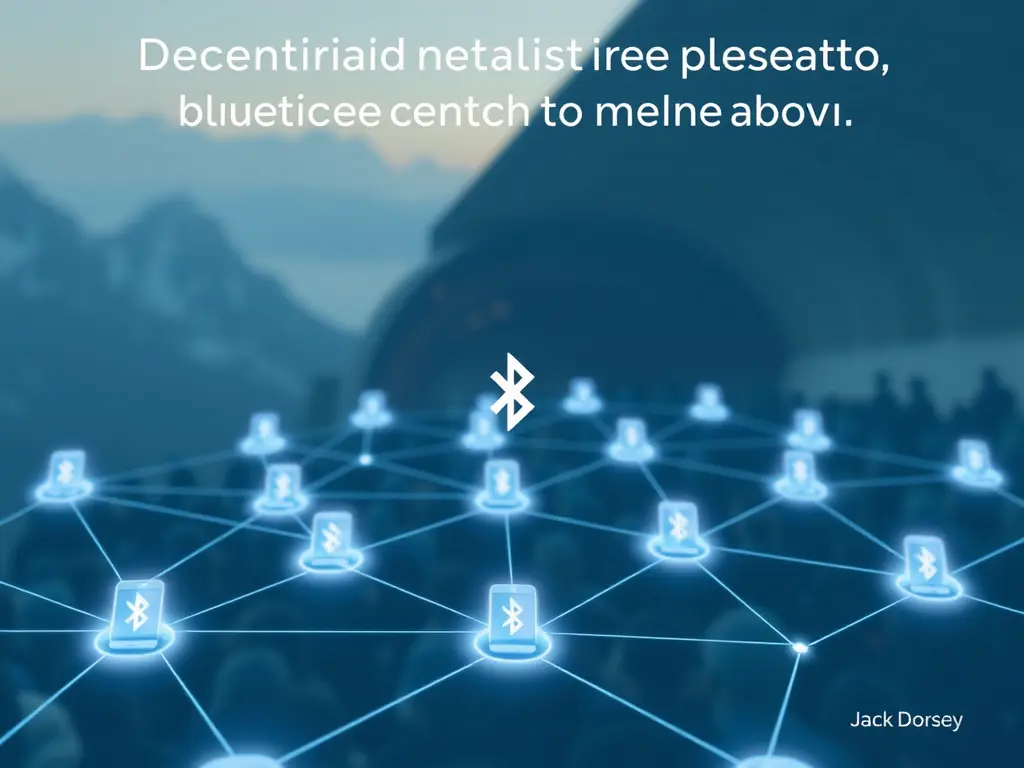In an era where internet connectivity drives communication, concerns about privacy, security, and censorship are growing. Enter Bitchat, a decentralized messaging app developed by Jack Dorsey, co-founder of Twitter and CEO of Block, Inc. Launched in July 2025, Bitchat operates without internet, Wi-Fi, or cellular data, using Bluetooth Low Energy (BLE) mesh networks to enable secure, peer-to-peer communication. This article explores how Bitchat works, its key features, challenges, and why it’s a game-changer for privacy-focused and offline communication.
What is Bitchat? A Decentralized Messaging Revolution
Bitchat is a peer-to-peer messaging app that allows users to send encrypted messages without relying on internet infrastructure. Unlike traditional apps like WhatsApp or Telegram, Bitchat uses Bluetooth mesh networks to connect devices directly, making it ideal for scenarios where internet access is unavailable, such as protests, natural disasters, or remote areas. Jack Dorsey introduced Bitchat as a weekend project, emphasizing its potential to provide censorship-resistant communication.
How Does Bitchat Work Without Internet?
Bitchat leverages Bluetooth Low Energy (BLE) mesh networks, where devices act as nodes to send and relay messages. Here’s how it functions:
- Device-to-Device Communication: Each phone running Bitchat connects to nearby devices within a 30-100 meter range, forming a local network.
- Message Hopping: Messages travel hop-by-hop through intermediate devices until they reach the recipient, even if they’re beyond direct Bluetooth range.
- Store-and-Forward: If a recipient is offline, messages are cached on nearby devices and delivered when the recipient reconnects.
- No Central Servers: Unlike traditional messengers, Bitchat eliminates central servers, reducing the risk of surveillance or data breaches.
This decentralized architecture, combined with end-to-end encryption, ensures that only the sender and recipient can read the messages, enhancing privacy and security.
Key Features of Bitchat Messaging App
Bitchat’s design prioritizes simplicity, privacy, and resilience. Here are its standout features:
1. End-to-End Encryption for Maximum Privacy
Bitchat uses advanced cryptographic protocols, including X25519 key exchange and AES-256-GCM encryption, to secure messages. Messages are stored temporarily in device memory, with no central database, minimizing the risk of data leaks.
2. No Accounts or Identifiers Needed
Unlike most messaging apps, Bitchat requires no phone number, email, or registration. Users are assigned random peer IDs (e.g., “anon1234”) for each session, ensuring anonymity.
3. Group Chats with Hashtags
Bitchat supports group chats created with hashtags and optional password protection, making it easy to organize private or public conversations.
4. Censorship-Resistant Design
With no central server to block or control, Bitchat is nearly impossible to censor, making it a powerful tool for activists, journalists, and users in restricted environments.
5. Emergency Wipe Feature
Bitchat includes a triple-tap feature to instantly clear all local data, providing an extra layer of security in high-risk scenarios.
Why Bitchat Matters: Use Cases and Benefits
Bitchat’s offline and decentralized nature makes it a versatile tool for various scenarios:
- Protests and Activism: During the 2019 Hong Kong protests, apps like Bridgefy used similar Bluetooth technology to bypass internet shutdowns. Bitchat’s enhanced encryption and privacy features make it a stronger alternative.
- Disaster Recovery: In natural disasters, when internet and cellular networks fail, Bitchat enables communication for emergency responders and communities.
- Remote Areas: In regions with limited connectivity, Bitchat provides a reliable way to stay connected without infrastructure.
- Privacy Advocacy: For users concerned about data privacy, Bitchat’s lack of central servers and anonymous design is a significant advantage.
Bitchat vs. Traditional Messaging Apps: A Comparison
Traditional messaging apps like WhatsApp, Telegram, and Signal rely on a client-server model, where messages pass through central servers. This model offers speed and efficiency but compromises on privacy and censorship resistance. Here’s how Bitchat differs:
| Feature | Bitchat | Traditional Apps |
|---|---|---|
| Internet Dependency | No (Bluetooth-based) | Yes (Wi-Fi or cellular) |
| Central Servers | None (P2P mesh network) | Required |
| Encryption | End-to-end (X25519, AES-256-GCM) | End-to-end (varies by app) |
| Anonymity | No accounts or identifiers | Phone number or email required |
| Censorship Resistance | High (decentralized) | Low (centralized infrastructure) |
Bitchat’s peer-to-peer model eliminates single points of failure, making it more resilient than apps like WhatsApp or Signal. However, its reliance on Bluetooth limits its range and bandwidth compared to internet-based apps.
Challenges Facing Bitchat
Despite its potential, Bitchat faces several challenges:
- Limited Range: Bluetooth’s range (30-100 meters per hop, up to 300 meters with relays) requires a dense network of users for long-distance communication.
- Battery Consumption: Continuous Bluetooth use may drain device batteries faster, especially in dense networks.
- Security Concerns: Early beta tests revealed vulnerabilities, such as issues with identity authentication and forward secrecy. Dorsey has since added a disclaimer that this app “has not received external security review.”
- Scalability: Bitchat’s effectiveness depends on user density. In sparsely populated areas, message relay may be unreliable.
- Android Availability: While available on the iOS App Store, the Android version is still in development, limiting its reach.
Dorsey has hinted at future updates, including WiFi Direct integration to improve speed and range, and open-source contributions to address security flaws.
The Future of Bitchat: What’s Next?
Bitchat’s launch marks a bold step toward decentralized communication, aligning with Dorsey’s vision for privacy-focused and censorship-resistant technologies. Future developments may include:
- WiFi Direct Integration: To enhance speed and extend range beyond Bluetooth’s limitations.
- IoT and Wearable Support: Expanding the mesh network to include IoT devices and wearables for broader applications.
- Global Adoption: Open-source development and community contributions could improve performance and security, driving adoption.
- Hybrid Models: Combining Bluetooth with solar-powered relays or other technologies to create robust offline networks.
As privacy concerns grow and internet outages become more common, This app could redefine how we communicate in challenging environments.
Try Bitchat Today
Bitchat is now available on the iOS App Store, with an Android version in development. If you’re passionate about privacy, decentralization, or need a reliable offline messaging solution, download Bitchat and join the beta community. Share your feedback on X or GitHub to help shape the future of this innovative app.
Sources: TechCrunch, Mashable, Cointelegraph, The Times of India, CCN






